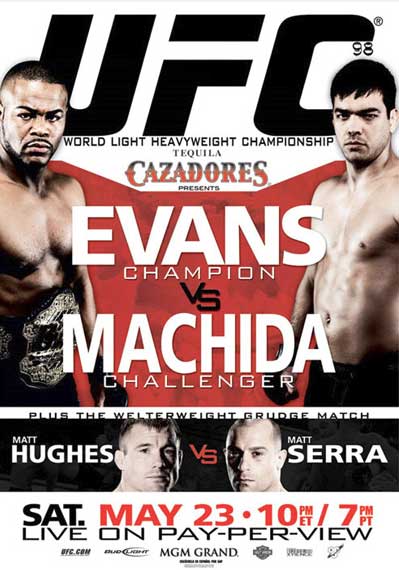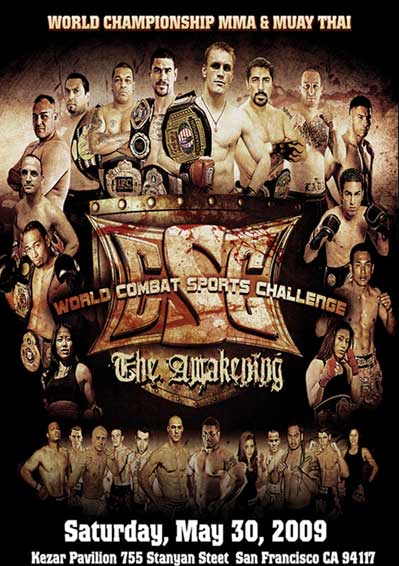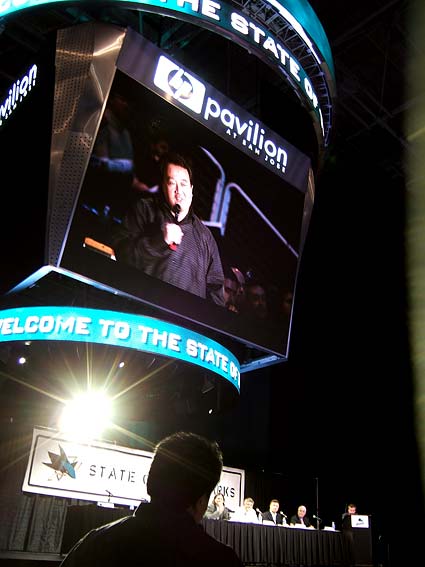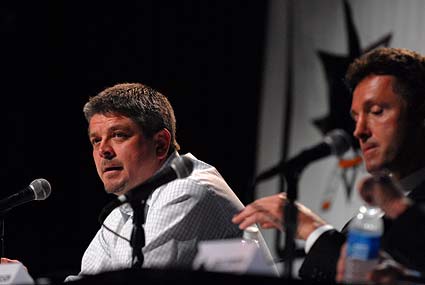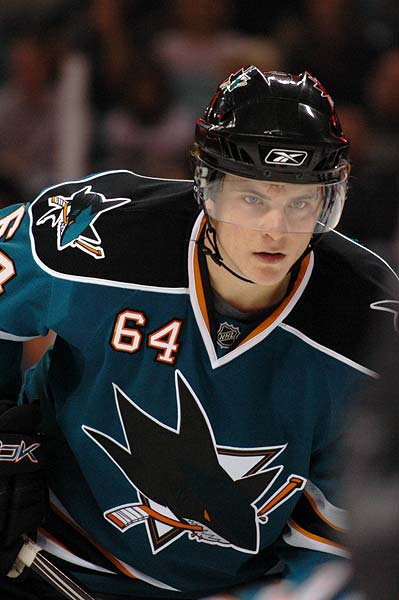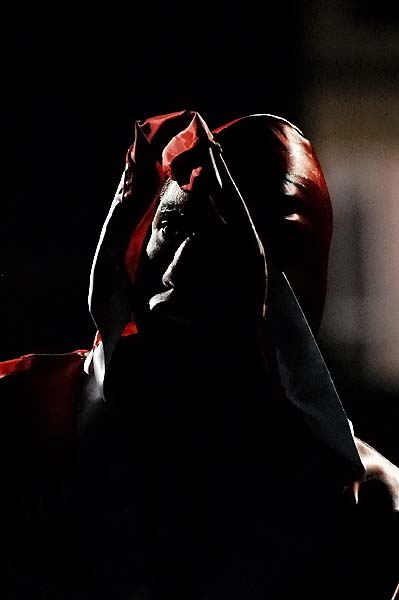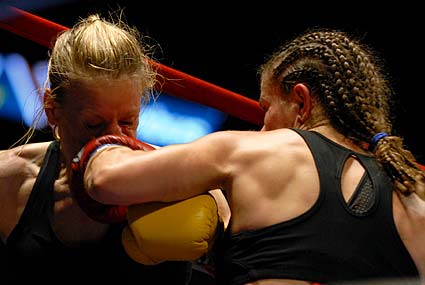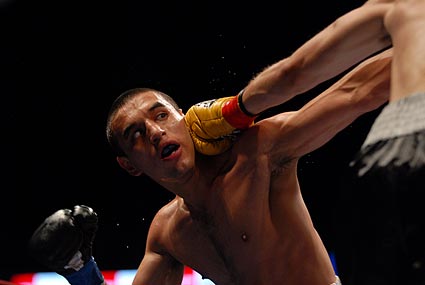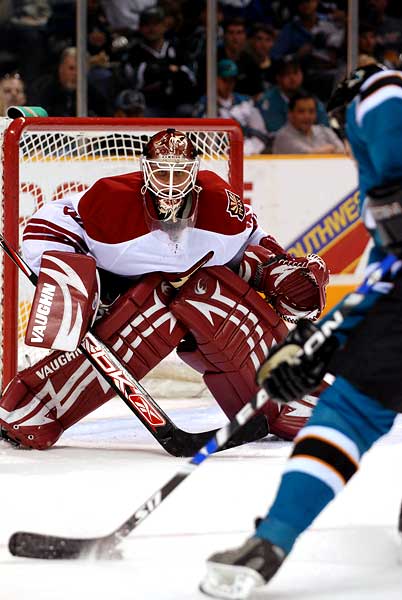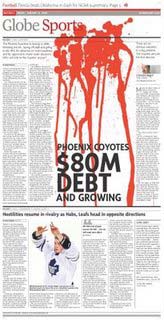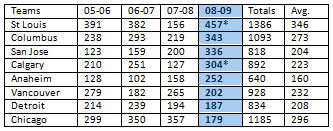Darryl Hunt: WorSharks Final 2008-09 Report Card
Each player’s grade is based on what was expected of them, how they performed against those expectations, and a general feel of how they have played compared to other players on the team. Players are listed by number, forwards first, then defensemen, and ending with the goaltenders. Following the players are grades for hockey operations and coaching staff.
6 Brad Staubitz LW (RFA-arbitration eligible)
Reg: 38 games: 0 goals, 5 assist, 5 point; (-11), 130PIM
Play: 10 games: 0 goals, 2 assists, 2 points; (-1), 15PIM
NHL: 35 games: 1 goal, 2 assists, 3 points; E, 76PIM
Staubitz is in Worcester what he is in San Jose, a fourth line physical presence. Last season after his switch from defense to forward Staubitz showed he does have some offensive skills by nearly doubling his career point total in just half a season, but this season those offensive numbers have all but disappeared. He is still learning his role as a forward, and occasionally takes ill-advised penalties by being over-aggressive.
Season highlight: Scored first NHL goal against Edmonton on 1/9
Grade: C
9 Tom Cavanagh C (UFA)
Reg: 51 games: 15 goals, 24 assists, 39 points; (-8), 37PIM
Play: 12 games: 3 goals, 2 assists, 5 points; +2, 8PIM
NHL: 17 games: 1 goal, 1 assist, 2 points; (-2), 4PIM
Cavanagh isn’t a flashy player, but he’s been one of the most consistent players on Worcester’s roster over the last three seasons. Cavanagh’s versatility is his strength, being able to play well in both ends of the ice. He has consistently been one of Worcester’s best face-off men, and played on the top two lines in all three aspects of the game.
Season highlight: 2 goal, 3 point game against Hartford on 10/31.
Grade: B
11 P.J. Fenton F (UFA)
Reg: 52 games: 6 goals, 8 assists, 14 points; +4, 22 PIM
Play: DNP
Fenton never really lived up to his reputation during the season, spending most of the season on the bottom two lines. Were it not for injuries in Worcester and San Jose Fenton would have most likely spent large parts of the season in Phoenix of the ECHL. Fenton does have the speed to play in the AHL, but his size and skill level projects him to be a borderline ECHL/AHL player.
Season highlight: Hat trick, 4 points vs Springfield on 2/28.
Grade: D
12 Matt Jones RW (1 year, $875,000)
Reg: 46 games: 2 goals, 6 assists, 8 points; +1, 19PIM
Play: DNP
Jones never really got back on track after being struck in the face by a clearing attempt and having his jaw broken against Bridgeport on October 25. Jones returned just before Christmas, but was obviously a little gun shy about playing the type of game that got him signed to a free agent deal in 2007. Hopefully Jones will be able to return to his pre-injury confidence next season.
Season highlight: Goal against Albany on 10/17
Grade: D
13 T.J. Fox C (RFA)
Reg: 79 games: 7 goals, 11 assists, 18 points; (-2), 15PIM
Play: 9 games: 3 goals, 0 assists, 3 points; E, 4PIM
Fox started off slowly, but really picked up his game in the second half of the season. Fox, teamed with Frazer McLaren, formed Worcester number one penalty killing line, and the confidence Head Coach Roy Sommer showed in him in that role spread to Fox’s play at even strength. The scouting report on Fox was that he was a goal scorer, but Fox has become a legitimate third-line defensive specialist that can fill in on the top two lines as needed.
Season highlight: Shorthanded goal, 2 assists vs Springfield on 2/28.
Grade: B
14 Frazer McLaren LW (2 years, $543,333)
Reg: 75 games: 7 goals, 1 assist, 8 points; (-11), 181PIM
Play: 12 games: 1 goal, 4 assists, 5 points; +3, 50PIM
McLaren went from a forth line enforcer that hardly saw any ice time to Worcester’s top penalty killing line and third line winger. When McLaren thinks like a hockey player, he shows an incredible amount of skill that surprises many opponents. Adding those skills to the enforcer role he held for most of the season could put him on a track for the NHL sooner than later.
Season highlight: Two goals, fight vs Albany on 3/7.
Grade: B
15 Steven Zalewski C (1 year, $660,000)
Reg: 75 games: 13 goals, 26 assists, 39 points; +5, 26PIM
Play: 12 games: 0 goals, 1 assists, 1 point; (-2), 6PIM
Zalewski started the season on fire, but hit the wall after January and his play suffered greatly. Zalewski seemed to be a step behind the play for most of the last third of the season, and went from one of Worcester’s best face-off men to one of its worse. Zalewski started the season on the top two even strength lines and playing on both ends of special teams play, and ended the season on the fourth line and getting almost no special teams play. Zalewski will definitely need to do conditioning work in the off season to be ready to play an 80 game schedule.
Season highlight: Five on three shorthanded, game tying goal against Houston on 11/22.
Grade: D
17 Ryan Vesce RW (UFA)
Reg: 67 games: 24 goals, 47 assists, 71 points; +4, 28PIM
Play: 12 games: 3 goals 7 assists, 10 points; (-2), 22PIM
NHL: 10 games: 0 goals, 0 assists, 0 points; (-2), 4 PIM
Vesce won every team MVP award given out, and with good reason. Vesce was simply the best overall player on the team, and while his game doesn’t translate well to the NHL he is a power in the AHL. Vesce had five OT goals, 10 game winning goals, 3 shorthanded goals, and 19 multi-point games during the regular season and playoffs. That’s pretty much all that needs to be said.
Season highlight: Game tying goal and double OT game winner in game three vs Hartford on 4/20.
Grade: A
18 Cory Larose C (UFA)
Reg: 53 games: 19 goals, 21 assists, 40 points; +2, 38PIM
Play: 8 games: 1 goal, 1 assist, 2 point; E, 4PIM
A bone-fide AHL first liner when on his game, Larose never really got back to 100% after a concussion suffered in late December, and then went on to suffer a rib injury in late February. Larose would have just four of his 42 total regular season and playoff points after March 21, and spent many of his later games on the fourth line. He finally was forced to sit due to injuries for Worcester’s last four post season games.
Season highlight: Gordie Howe hat trick at Lowell on 1/24.
Grade: C
19 Mike Morris RW (RFA-arbitration eligible)
Reg: 17 games: 5 goals, 6 assists, 11 points; (-2), 6PIM
Play: DNP
Concussions have limited Morris to just 26 games over two seasons. When Morris plays he’s one of the best players on the ice. But it appears his health is going to be a problem, and it’s been reported that it won’t be until July that it’s known if he can continue to play professional hockey.
Season highlight: Goal, assist against Manchester on 11/1
Grade: Incomplete
20 Riley Armstrong RW (RFA-arbitration eligible)
Reg: 71 games: 25 goals, 17 assists, 42 points; +8, 101PIM
Play: 12 games: 3 goals, 10 assists, 13 points; +4, 46PIM
NHL: 2 games: 0 goals, 0 assists, 0 points; (-1), 2PIM
Armstrong has made the transition from young prospect to AHL veteran, and it shows in his play on the ice. While still the antagonist, Armstrong has added a scoring touch this season and can play any spot on any of Worcester’s lines both at even strength and special teams. Armstrong probably doesn’t have NHL talent, but he most certainly can have a long AHL career with his continued aggressive play.
Season highlight: Hat trick, including a game winning goal, against Norfolk on 1/2.
Grade: A
21 Matt Fornataro C (UFA)
Reg: 51 games: 10 goals, 15 assists, 25 points; (-10), 30PIM
Play: 1 game: 0 goals, 1 assist, 1 point; +1, 0PIM
Fornataro is the standard AHL-depth forward. He has good puck presence and very good vision of the ice. If effort were enough to make the NHL Fornataro would be a superstar, but his skill level will most likely limit him to the AHL. Despite that, he should have few issues landing himself an AHL job next season, if not in Worcester than somewhere else.
Season highlight: 2 goals, assist vs Philadelphia on 3/6
Grade: B
22 Lukas Kaspar LW (RFA-arbitration eligible)
Reg: 65 games: 17 goals, 27 assists, 44 points; +11, 40PIM
Play: 12 games: 2 goals, 2 assists, 4 points; (-1), 0PIM
NHL: 13 games: 2 goals, 2 assists, 4 points; E, 8PIM
The enigma that is Lukas Kaspar continued in the 2008-09 season. Kaspar would have huge stretches where it looked like he was finally breaking through and playing to his full potential, only to suddenly go back to looking disinterested in playing pro hockey. Kaspar has all the skills and speed to play in the NHL, the only thing in question is his heart and work ethic. Being a first round pick means San Jose will most certainly give him a qualifying offer, but rumors are abound in Worcester that Kaspar is heading to Europe for next season.
Season highlight: Goal, two assists against Portland on 12/29
Grade: C
23 Dan DaSilva RW (UFA)
Reg: 26 games: 6 goals, 7 assists, 13 points; +9, 27PIM
Play: 12 games: 3 goals, 7 assists, 10 points; +2, 6PIM
DaSilva spent most of the season in Phoenix of the ECHL, but immediately became one of Worcester’s best players when recalled in early March. He, along with Andrew Desjardins and PTO signee Trent Campbell, formed the aptly named “E Line” and literally carried the team out of a March slump and back into the playoff race. DaSailva’s five game winning goals in 38 total games put him third on the team, behind two players with more than double his game total.
Season highlight: Two goals, assist in game six against Hartford on 4/25
Grade: B
33 Andrew Desjardins C (UFA)
Reg: 74 games: 8 goals, 14 assists, 22 points; +4, 99PIM
Play: 12 games: 4 goals, 2 assists, 6 points; +7, 13PIM
Desjardins was one of two players to play on the team after going to Worcester’s free agent/rookie camp (DaSilva was the other). Desjardins was primarily the team’s third line center, but filled in on all four lines as needed. He was part of the penalty kill rotation, and did see sporadic power play time. Desjardins can play both a physical or finesse game, and can change from shift to shift depending on whichever role is needed.
Season highlight: Three assists and a fight against Norfolk on 1/2.
Grade: B
37 Logan Couture C (3 years, $1, 270,833)
Reg: 4 games, 0 goals, 0 assists, 0 points; (-1), 7PIM
Play: 12 games: 2 goals, 1 assist, 3 points; +5, 11PIM
The future is bright for Couture despite being a little outmatched in his first stint in the AHL. Couture has the best hands this writer has ever seen on a young player, and after a full off season as a professional working on his skating, strength, and conditioning he certainly has the potential of being a game changing forward in the AHL next season, and in the NHL in seasons beyond.
Season highlight: Scored first professional goal in game four against Hartford on 4/25
Grade: C
44 Jamie McGinn LW (2 years, $996,667)
Reg: 47 games: 19 goals, 11 assists, 30 points; +4, 52PIM
Play: 6 games: 4 goals, 0 assists, 4 points; (-3), 19PIM
NHL: 35 games: 4 goals, 2 assists, 6 points; (-6), 2PIM
McGinn has had five separate stints in San Jose this season as the rookie stands on the brink of being an NHL regular. The rookie never seemed to miss a beat after his recalls were over, and he really never had a bad game this season. His play on the top two lines has been very solid, along with his play on both the penalty kill and power play. He needs a little work along the boards, but is otherwise good to go to the NHL.
Season highlight: Goal, assist in second NHL game against Detroit on 10/30.
Grade: A
2 Patrick Traverse D (UFA)
Reg: 78 games: 9 goals, 33 assists, 42 points; (-3), 28PIM
Play: 12 games: 4 goals, 5 assists, 9 points; +6, 4PIM
In his 16th pro season, it’s obvious that Traverse has lost a step. But what he now lacks in speed he makes up for in experience and patience, which are things he readily passes along to his younger defensive partners. Offensively Traverse had his best season, setting career highs in points and assists. His nine playoff points more than double his previous high.
Season highlight: Two goals, assist in game five against Hartford on 4/23
Grade: B
4 Kyle McLaren D (UFA)
Reg: 22 games: 1 goal, 6 assists, 7 points; +1, 19PIM
Play: 7 games: 0 goals, 1 assist, 1 point; +4, 2PIM
A hand injury--and subsequent surgery--after a cheap shot delivered by Norfolk’s Steve Downie on 11/19 sidelined McLaren for most of the season. But when he did play he was by far the best player on the ice. Salary issues were the reason he was assigned to the AHL, but he still showed the heart of an NHLer every time he stepped on the ice, including playing several playoff games after breaking his foot blocking a shot in game three against Hartford.
Season highlight: Goal against Manchester on 4/4
Grade: A
5 Jason Demers D (2 years, $543,000)
Reg: 78 games: 2 goals, 31 assists, 33 points; +15, 54PIM
Play: 12 games: 0 goals, 4 assists, 4 points; (-7), 6PIM
When Demers first got here the rookie quickly earned the nickname “Wrong Way” because he always seemed to be skating in a direction opposite of that of the puck. That, thankfully, isn’t the case anymore. Demers has made a huge amount of progress on both ends of the ice, and his development has earned comparisons to Derek Joslin and the path Joslin took to get where he is. Demers has a long way to go to be NHL-ready, but there’s no reason to think he can’t make it based on how far he’s come in his rookie campaign.
Season highlight: Three assists and a fight against Norfolk on 11/19
Grade: B
7 Brendan Buckley D (UFA)
Reg: 67 games: 1 goal, 8 assists, 9 points; +6, 137PIM
Play: 10 games: 1 goal, 2 assists, 3 points; +4, 18PIM
When Buckley suited up on 10/25 he became the second former Worcester IceCat to play for the Sharks (Traverse is the other). A physical player, the ten year pro still has an issue about when to play the puck and when to play the player. Never blessed with incredible speed, Buckley has always relied on his strength to defend the net. Against players who have lots of speed, Buckley has problems. Despite his shortcomings he was still a valuable asset to the team.
Season highlight: Shorthanded goal against Manchester on 12/20
Grade: C
8 Mike Moore D (1 year, $1,000,000)
Reg: 76 games: 5 goals, 13 assists, 18 points; +14, 132PIM
Play: 12 games: 0 goals, 1 assist, 1 point; +7, 17PIM
NHL: Recalled, DNP
Moore is the most physical of all the WorSharks defensemen, throwing bone-crunching open ice hits on a regular basis. Opponents are no safer along the boards, as Moore has twice checked players through the penalty box door and has deposited more than a couple of players back onto their own benches. Offensively Moore is become much more comfortable, and has the speed to rush up ice and still get back in time to maintain his defensive responsibilities. Moore is without a doubt a bona-fide NHL prospect. Season highlight: First career professional goal against Norfolk on 11/19.
Grade: A
24 Brett Westgarth D (UFA)
Reg: 77 games: 2 goals, 7 assists, 9 points; +6, 137PIM
Play: 9 games: 0 goals, 0 assists, 0 points; +2, 42PIM
Westgarth struggled early in the season while trying to figure out what his role would be. With the earlier surplus of defensemen Westgarth was used on the fourth forward line so his physical presence could be used, and while he didn’t play badly it was obvious he wasn’t very comfortable up front. Westgarth was obviously back in his element once put back on defense. He often teamed with Moore, making them one of the most physical pairs in the AHL. Westgarth is a solid AHL depth player, who with some hard work might make a long shot run at the NHL.
Season highlight: Game winning goal against Lowell on 1/10
Grade: C
25 Derek Joslin D (1 year, $515,667)
Reg: 63 games: 11 goals, 19 assists, 30 points; (-6), 40PIM
Play: 12 games: 0 goals, 2 assists, 2 points; (-6), 8PIM
NHL: 12 games: 0 goals, 0 assists, 0 points, (-3), 6PIM
After a decent rookie campaign, Joslin started the first half of the season almost ready for the NHL. His great mix of offensive and defensive skills could make him a two-way force in the NHL for years to come. Unfortunately, in the second half of the season Joslin took a step backwards and made many mistakes in crucial moments. On defense Joslin can play either physical or passive depending on whatever the situation calls for, and his transition game from defense to offense is second to only Moore. Joslin, the winner of the hardest shot at 98.6mph at the AHL skills competition, had lots of problems getting that shot through to the net. While the AHL doesn’t keep the stat of shots blocked, it would be hard to fathom a player that had more shots blocked than Joslin.
Season highlight: Two goals vs Providence on 4/11
Grade: C
26 Michael Wilson (UFA)
Reg: 31 games: 1 goal, 4 assists, 5 points; (-10) 14PIM
Play: DNP
Were it not for injuries and recalls Wilson would probably be a top-tier ECHL defenseman this season. The undersized, offense-first blueliner is overmatched defensively in the AHL. Wilson, at 165 pounds, needs to add some muscle mass to be able to compete at this level. He probably has enough offensive skills to keep himself afloat in the ECHL, but a defenseman that can’t play defense will eventually turn into a liability.
Season highlight: First career professional goal against Albany on 10/17
Grade: F
29 Thomas Greiss G (RFA)
Reg: 57 games: 30-24-2, 2.47, .907, 1 shutout, 1 assist, 0PIM
Play: 12 games: 6-6-0, 2.43, .912, 2 shutouts, 0PIM
NHL: Recalled, DNP
Greiss started off slow, going just 9-9-1 in the 2008 portion of the season. Better play, both by Greiss and the defense in front of him, helped him to separate four and five game winning streaks to set a career high 30 wins over the entire campaign. Greiss was also instrumental in getting Worcester into the post season, winning eight of the team’s last ten games, including his first professional shutout in the season finale against Providence.
Season highlight: 1-0 shutout win in game three vs Providence on 5/9
Grade: B
39 Taylor Dakers (RFA)
Reg: 21 games: 11-9-0, 2.85, .897, 0 points, 0PIM
Play: DNP
Dakers started the season on a five game winning streak, but played just “average” over the rest of the campaign. Dakers looks to be a goaltender that plays best when being an everyday player, and with Greiss in front of him this season that wasn’t going to happen. With several goaltending prospects entering the system over the next few seasons time is running short for Dakers to make a mark in the organization. Season ending hip surgery that will result in Dakers not being able to play until November is another hurdle in his way to an AHL roster spot.
Season highlight: First professional shutout against Springfield on 11/16.
Grade: C
Hockey operations
The fans of Worcester were promised a more competitive team, and for the most part hockey operations came through. Obviously every fan would love to have more goal scorers, or another shut-down defenseman, but all in all Worcester was dealt a pretty good hand. There were some bumps in the road, but in general the team was competitive night in and night out. And when injuries and recalls happened, Worcester was able to dip into the ECHL and found players talented enough to give the team a chance to win most nights.
Grade: B
Head Coach Roy Sommer
Two incidents are in the front of Worcester fans’ minds when it comes to Roy Sommer this season. The first was Sommer pulling Thomas Greiss for an extra attacker with 4.5 seconds remaining in the first period--yes, first period--at Springfield and holding a 1-0 lead. Springfield’s Tyler Spurgeon promptly beat Tom Cavanagh cleanly on a faceoff in the Falcons zone, and Mathieu Roy fired the puck the length of the ice to tie the game at 1-1 at 19:58. “I’ve done that 30 times in my coaching career,” Sommer told Bill Ballou of the Telegram & Gazette. “I’ve even timed it. With three seconds or less, you can’t win the draw and hit the open net. Can’t be done. Four seconds is stretching it.” Readers will note the faceoff took place with more than four seconds remaining in the period.
The second was during the last game of the regular season. Sommer picked that game to finally blow a gasket when referee Frederic L'Ecuyer ruled Steven Zalewski had kicked a puck into the net. It was a borderline call, but L'Ecuyer waved it off immediately without hesitation. Inexplicably, with his team up 3-0 and just over three minutes remaining in Greiss' shutout bid, Sommer picked that time to argue with the referee. L'Ecuyer let Sommer go on for a few seconds and skated away, but after Sommer continued jawing at him L'Ecuyer gave Worcester a bench minor and threw Sommer out of the game.
Sommer does get credit for implementing San Jose’s new offensive system in Worcester with relative few issues, but that’s pretty close to the only positive mark for his season. When fans give you a mock cheer when you call timeout, your days should be numbered. A division finals appearance is the only thing preventing a failing grade, but one has to wonder if that finish was due to Sommer or the presence of Bryan Marchment behind the bench in the later part of the season.
Grade: D















